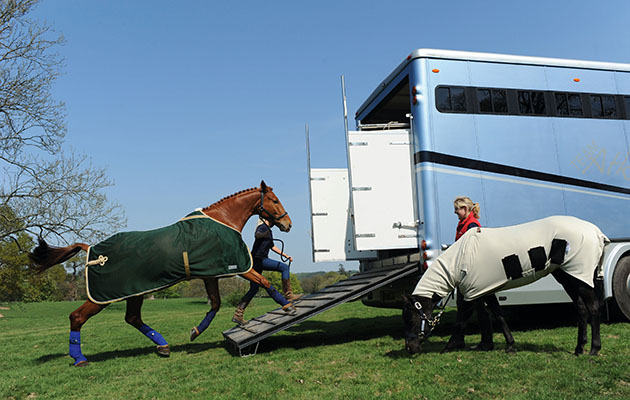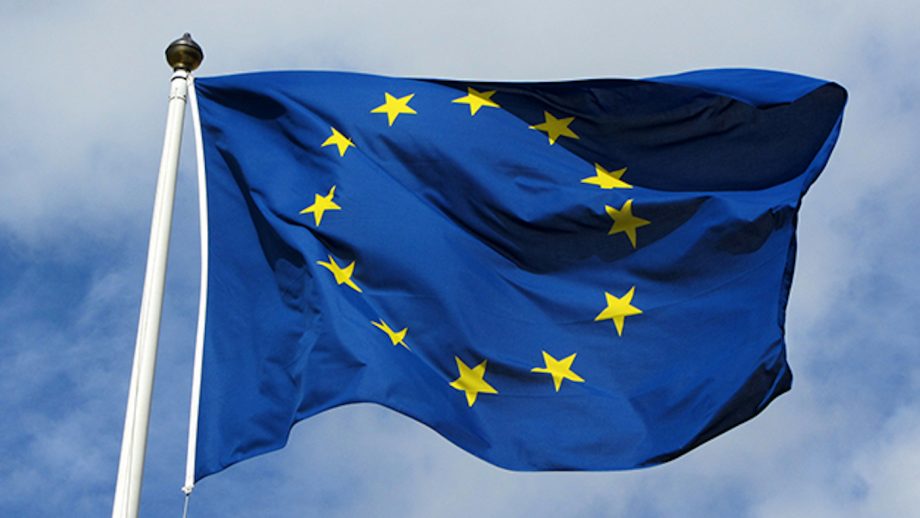The International Horse Sports Confederation and FEI president Ingmar de Vos has warned if the links between the equestrian industry in Britain and EU member states is not protected, Europe risks an estimated €17bn (£15.4bn) reduction in economic contribution and the potential loss of 250,000 jobs, so “failure is not an option”. Find out more about what is happening to secure the industry’s future below...
Another step has been made in securing the future of the British and wider European equestrian industry, as a leading industry body warns the cost of failure could run to billions.
Proposals to secure seamless international transport of horses with high health status – such as competition horses, racehorses and breeding stock – between the UK and EU member states have been put forward to chief Brexit decision-makers.
{"content":"PHA+VGhlIEludGVybmF0aW9uYWwgSG9yc2UgU3BvcnRzIENvbmZlZGVyYXRpb24gKElIU0MpIHRhc2sgZm9yY2UgZm9yIEJyZXhpdCBhbmQgRVUgQW5pbWFsIEhlYWx0aCBMYXcsIHdoaWNoIGlzIG1hZGUgdXAgb2Ygc2l4IHJlcHJlc2VudGF0aXZlcyBmcm9tIEV1cm9wZWFuIHNwb3J0IGhvcnNlIGFuZCB0aG9yb3VnaGJyZWQgcmFjaW5nIGFuZCBicmVlZGluZyBpbmR1c3RyaWVzLCBjb21waWxlZCB0aGUgMTQtcGFnZSBkb3NzaWVyLiBJdCBjb3ZlcnMgPGEgaHJlZj0iaHR0cHM6Ly93d3cuaG9yc2VhbmRob3VuZC5jby51ay9wbHVzL25ld3MtcGx1cy9kaWdpdGFsLWhvcnNlLXBhc3Nwb3J0cy1mb3ItZnV0dXJlLWhvcnNlLXRyYXZlbC03MjU2MzQiIHRhcmdldD0iX2JsYW5rIiByZWw9Im5vb3BlbmVyIG5vcmVmZXJyZXIiPmRpZ2l0YWwgcGFzc3BvcnRzIChuZXdzLCAyNCBTZXB0ZW1iZXIpPC9hPiBhbmQgYWxzbyByZXF1ZXN0cyB0aGF0IGEgdHJhZGUgYWdyZWVtZW50IHJlZmxlY3RzIHRoZSBmYWN0IHRoYXQgaGlnaCBoZWFsdGggc3RhdHVzIGhvcnNlcyBpbiBCcml0YWluIGhhdmUgdGhlIHNhbWUgc3RhdHVzIGluIEVVIG1lbWJlciBzdGF0ZXMuPC9wPgo8cD5UaGUgdGFzayBmb3JjZSBoYXMgd2FybmVkIGlmIHRoZSBpbmR1c3RyeSBpcyBub3QgcHJvdGVjdGVkLCBFdXJvcGUgcmlza3MgYW4gZXN0aW1hdGVkIOKCrDE3Ym4gKMKjMTUuNGJuKSByZWR1Y3Rpb24gaW4gZWNvbm9taWMgY29udHJpYnV0aW9uIGFuZCB0aGUgcG90ZW50aWFsIGxvc3Mgb2YgMjUwLDAwMCBqb2JzLCBzbyDigJxmYWlsdXJlIGlzIG5vdCBhbiBvcHRpb27igJ0uPC9wPgo8cD7igJxaZXJvIHRhcmlmZnMgYXJlIGFscmVhZHkgaW4gcGxhY2UgYW5kIHRoZSB0YXNrIGZvcmNlIGlzIHJlcXVlc3RpbmcgdGhhdCB0aGV5IGJlIG1haW50YWluZWQsIHdpdGggdGhlIHNjaGVtZSBiZWluZyBleHRlbmRlZCB0byBnZWxkaW5ncy4gQ3VycmVudGx5IG9ubHkgc3RhbGxpb25zIGFuZCBtYXJlcyBhcmUgZWxpZ2libGUgZm9yIHRhcmlmZi1mcmVlIGNyb3NzLWJvcmRlciB0cmFuc3BvcnQs4oCdIHNhaWQgYW4gSUhTQyBzcG9rZXNtYW4uPC9wPgo8cD48ZGl2IGNsYXNzPSJhZC1jb250YWluZXIgYWQtY29udGFpbmVyLS1tb2JpbGUiPjxkaXYgaWQ9InBvc3QtaW5saW5lLTIiIGNsYXNzPSJpcGMtYWR2ZXJ0Ij48L2Rpdj48L2Rpdj48c2VjdGlvbiBpZD0iZW1iZWRfY29kZS0zMSIgY2xhc3M9ImhpZGRlbi1tZCBoaWRkZW4tbGcgcy1jb250YWluZXIgc3RpY2t5LWFuY2hvciBoaWRlLXdpZGdldC10aXRsZSB3aWRnZXRfZW1iZWRfY29kZSBwcmVtaXVtX2lubGluZV8yIj48c2VjdGlvbiBjbGFzcz0icy1jb250YWluZXIgbGlzdGluZy0tc2luZ2xlIGxpc3RpbmctLXNpbmdsZS1zaGFyZXRocm91Z2ggaW1hZ2UtYXNwZWN0LWxhbmRzY2FwZSBkZWZhdWx0IHNoYXJldGhyb3VnaC1hZCBzaGFyZXRocm91Z2gtYWQtaGlkZGVuIj4NCiAgPGRpdiBjbGFzcz0icy1jb250YWluZXJfX2lubmVyIj4NCiAgICA8dWw+DQogICAgICA8bGkgaWQ9Im5hdGl2ZS1jb250ZW50LW1vYmlsZSIgY2xhc3M9Imxpc3RpbmctaXRlbSI+DQogICAgICA8L2xpPg0KICAgIDwvdWw+DQogIDwvZGl2Pg0KPC9zZWN0aW9uPjwvc2VjdGlvbj48L3A+CjxwPuKAnElmIGFwcHJvdmVkLCB0aGUgZS1wYXNzcG9ydCB3b3VsZCBoYXZlIG5vIGZpbmFuY2lhbCBpbXBsaWNhdGlvbnMgZm9yIHRoZSBFVSBhcyBjb3N0cyBhcm91bmQgZmluYWwgZGV2ZWxvcG1lbnQsIGltcGxlbWVudGF0aW9uIGFuZCBydW5uaW5nIG9mIHRoZSBzeXN0ZW0gd2lsbCBiZSBtZXQgYnkgdGhlIGVxdWluZSBpbmR1c3RyeS48YnIgLz4K4oCcVXNpbmcgYSB0d28tcHJvbmdlZCBhcHByb2FjaCwgdGhlIHRhc2sgZm9yY2UgaXMgc2Vla2luZyB0byBoYXZlIGl0cyBwcm9wb3NhbHMgY2FwdHVyZWQgaW4gdGhlIHRleHQgb2YgYm90aCB0aGUgdHJhZGUgYWdyZWVtZW50IGFuZCBpbiB0aGUgRVUgYW5pbWFsIGhlYWx0aCBsYXcsIHdoaWNoIGNvbWVzIGludG8gZm9yY2Ugb24gMjEgQXByaWwgMjAyMS7igJ08L3A+CjxwPlRoZSBwcm9wb3NhbHMgaGF2ZSBiZWVuIHNlbnQgdG8gTWljaGVsIEJhcm5pZXIsIHRoZSBFdXJvcGVhbiBDb21taXNzaW9u4oCZcyBoZWFkIG9mIHRhc2sgZm9yY2UgZm9yIHJlbGF0aW9ucyB3aXRoIHRoZSBVbml0ZWQgS2luZ2RvbSBhbmQgdG8gTG9yZCBGcm9zdCwgdGhlIEJyaXRpc2ggcHJpbWUgbWluaXN0ZXLigJlzIEV1cm9wZSBhZHZpc2VyIGFuZCBjaGllZiBuZWdvdGlhdG9yIG9mIOKAnFRhc2sgRm9yY2UgRXVyb3Bl4oCdLjwvcD4KPHA+U2hvdWxkIGEgdHJhZGUgYWdyZWVtZW50IHdpdGggQnJpdGFpbiBub3QgYmUgcmVhY2hlZCwgdGhlIHRhc2sgZm9yY2UgaXMgYXNraW5nIHRoZSBFVSB0byBkZWNsYXJlIGFuIOKAnGVxdWlsaWJyaXVtIG9mIGhlYWx0aCBzdGF0dXMgZm9yIEEtbGlzdGVkIDNyZCBjb3VudHJpZXPigJ0uPC9wPgo8ZGl2IGNsYXNzPSJhZC1jb250YWluZXIgYWQtY29udGFpbmVyLS1tb2JpbGUiPjxkaXYgaWQ9InBvc3QtaW5saW5lLTMiIGNsYXNzPSJpcGMtYWR2ZXJ0Ij48L2Rpdj48L2Rpdj4KPHA+4oCcVGhlIGVxdWluZSBpbmR1c3RyeSBpcyBvZiBjcnVjaWFsIGltcG9ydGFuY2UgdG8gdGhlIGVjb25vbWljLCBzb2NpYWwsIHNwb3J0aW5nIGFuZCBjdWx0dXJhbCBmYWJyaWMgb2YgYm90aCB0aGUgRXVyb3BlYW4gVW5pb24gYW5kIHRoZSBVbml0ZWQgS2luZ2RvbSwgYW5kIGFzIHJlcHJlc2VudGF0aXZlcyBmcm9tIGFsbCBzZWN0b3JzIG9mIHRoYXQgaW5kdXN0cnksIHdlIGJlbGlldmUgdGhhdCB0aGVyZSBhcmUgc2ltcGxlIHNvbHV0aW9ucyB0aGF0IGNhbiBndWFyYW50ZWUgYSBzZWN1cmUgZnV0dXJlIGZvciB0aGUgRXVyb3BlYW4gZXF1aW5lIGluZHVzdHJ5LOKAnSBzYWlkIElIU0MgYW5kIEZFSSBwcmVzaWRlbnQgSW5nbWFyIGRlIFZvcy48L3A+CjxwPuKAnEl0IGlzIG9uZSBvZiB0aGUgbW9zdCBpbXBvcnRhbnQgYW5pbWFsIGJyZWVkaW5nIGFuZCBwcm9kdWN0aW9uIHNlY3RvcnMgaW4gRXVyb3BlLCBsYXJnZXIgYW5kIHdpdGggZ3JlYXRlciBlY29ub21pYyBpbXBhY3QgYW5kIGVtcGxveW1lbnQgdGhhbiBhIG51bWJlciBvZiBvdGhlciBFdXJvcGVhbiBhZ3JpY3VsdHVyYWwgc2VjdG9ycywgd2l0aCBhIG5ldCB3b3J0aCBvZiBvdmVyIOKCrDUyYm4gKMKjNDdibikgcGVyIGFubnVtLCBwcm92aWRpbmcgMjEwLDAwMCBkaXJlY3QgYW5kIG1vcmUgdGhhbiA1MDAsMDAwIGluZGlyZWN0IGpvYnMuPC9wPgo8ZGl2IGNsYXNzPSJhZC1jb250YWluZXIgYWQtY29udGFpbmVyLS1tb2JpbGUiPjxkaXYgaWQ9InBvc3QtaW5saW5lLTQiIGNsYXNzPSJpcGMtYWR2ZXJ0Ij48L2Rpdj48L2Rpdj4KPHA+4oCcT3VyIGdvYWwgaXMgdG8gcmVhY2ggYW4gYWdyZWVtZW50IHRoYXQgd2lsbCBhbGxvdyBmb3IgYSBjb250aW51YXRpb24gb2YgdGhlIGhpc3RvcmljYWwgZXhwZWRpdGVkIG1vdmVtZW50IG9mIGhvcnNlcyBmb3IgYnJlZWRpbmcsIHNhbGUgYW5kIGNvbXBldGl0aW9uIGJldHdlZW4gRVUgbWVtYmVyIHN0YXRlcyBhbmQgQnJpdGFpbi4gV2hpbGUgdGhlcmUgYXJlIHNvbWUgc2VjdG9ycyBjdXJyZW50bHkgdW5kZXIgZGlzY3Vzc2lvbiB0aGF0IHNlZW0gdG8gcmVtYWluIGRpZmZpY3VsdCBpbiB0aGUgbmVnb3RpYXRpb25zLCB3ZSBiZWxpZXZlIHRoYXQgdGhlcmUgYXJlIHNpbXBsZSBzb2x1dGlvbnMgd2l0aGluIHRoZSBlcXVpbmUgaW5kdXN0cnkgdGhhdCBjYW4gYmUgcmVhZGlseSBpbmNsdWRlZCBpbiBhIGZyZWUgdHJhZGUgYWdyZWVtZW50LiBJbmRlZWQsIHRoZXkgYXJlIGFsc28gd29ya2FibGUgZXZlbiBpbiBhIG5vLWRlYWwgc2NlbmFyaW8uPC9wPgo8cD7igJxXZSBhcmUgYXNraW5nIHRoZSBuZWdvdGlhdG9ycyBvbiBib3RoIHNpZGVzIG9mIHRoZSB0YWJsZSB0byB0YWtlIG91ciBwcm9wb3NhbHMgb24gYm9hcmQgYW5kIGluY29ycG9yYXRlIHRoZW0gaW50byB0aGUgdGV4dHMgb2YgdGhlIHRyYWRlIGFncmVlbWVudCwgaWYgdGhlcmUgaXMgb25lLCBhbmQgdGhlIEVVIHRvIGluY2x1ZGUgdGhlbSBpbiB0aGUgaW5jb21pbmcgRVUgYW5pbWFsIGhlYWx0aCBsYXcsIHdoaWNoIGNvbWVzIGludG8gZWZmZWN0IG5leHQgQXByaWwuPC9wPgo8ZGl2IGNsYXNzPSJhZC1jb250YWluZXIgYWQtY29udGFpbmVyLS1tb2JpbGUiPjxkaXYgaWQ9InBvc3QtaW5saW5lLTUiIGNsYXNzPSJpcGMtYWR2ZXJ0Ij48L2Rpdj48L2Rpdj4KPHA+4oCcV2l0aG91dCBhZ3JlZW1lbnQgb24gdGhpcywgd2UgZXN0aW1hdGUgdGhhdCB0aGUgaW5kdXN0cnkgaW4gRXVyb3BlIGNvdWxkIHNocmluayBieSBhcyBtdWNoIGFzIGEgdGhpcmQsIHdpdGggYSBwb3RlbnRpYWwg4oKsMTdibiByZWR1Y3Rpb24gaW4gZWNvbm9taWMgY29udHJpYnV0aW9uLCBhbmQgdGhlIHBvdGVudGlhbCBsb3NzIG9mIDI1MCwwMDAgam9icyBpbiBhIG1hcmtldHBsYWNlIGFscmVhZHkgdGhyZWF0ZW5lZCB3aXRoIGNyaXRpY2FsIHVuZW1wbG95bWVudCBsZXZlbHMgYW5kIGEgc2lnbmlmaWNhbnQgcmVkdWN0aW9uIGluIGZvcmVpZ24gZGlyZWN0IGludmVzdG1lbnQgaW4gdGhlIEV1cm9wZWFuIFVuaW9uIGFzIHRoZSBlY29ub21pYyBmb2N1cyBzaGlmdHMgdG8gTm9ydGggQW1lcmljYSBhbmQgQXNpYS4gU28gZmFpbHVyZSBpcyBub3QgYW4gb3B0aW9uIeKAnTwvcD4KPHA+QnJpdGlzaCBFcXVlc3RyaWFuIENFTyBJYWluIEdyYWhhbSB0b2xkIDxlbT5IJmFtcDtIPC9lbT46IOKAnOKAnEJyaXRpc2ggRXF1ZXN0cmlhbiBzdXBwb3J0cyB0aGUgbW92ZSB0byBkaWdpdGFsIGlkZW50aWZpY2F0aW9uIG9mIGhvcnNlcyB1c2luZyBlbGVjdHJvbmljIHBhc3Nwb3J0cy4gVW5kZXJzdGFuZGluZyB3aGVyZSBob3JzZXMgYXJlIGtlcHQgYW5kIHJlY29yZGluZyByZWxldmFudCBtb3ZlbWVudHMgd2lsbCBoZWxwIHdpdGggZGlzZWFzZSBtYW5hZ2VtZW50IGFuZCBlbWVyZ2luZyB0ZWNobm9sb2dpZXMgZGVsaXZlcmVkIHZpYSBzbWFydHBob25lIGFwcCB3aWxsIGJlIGtleSB0byBpbXByb3ZpbmcgdHJhY2VhYmlsaXR5LiBBcyB3ZSBwcmVwYXJlIGF0aGxldGVzIGFuZCB0ZWFtcyBmb3IgY29tcGV0aXRpb24gb25jZSB0aGUgdHJhbnNpdGlvbiBwZXJpb2QgaXMgb3Zlciwgc3RyZWFtbGluZWQgbW92ZW1lbnRzIGFuZCBib3JkZXIgY3Jvc3NpbmdzIGZvciBoaWdoIGhlYWx0aCBob3JzZXMgYXJlIHBpdm90YWwu4oCdPC9wPgo8aDM+S2VudCBhY2Nlc3MgcGVybWl0czwvaDM+CjxwPkhvcnNlYm94ZXMgdHJhdmVsbGluZyB0byBFdXJvcGUgdmlhIEtlbnQgbG9vayBsaWtlbHkgdG8gcmVxdWlyZSBhIG5ldyBwZXJtaXQgb3IgcmlzayBhIMKjMzAwIGZpbmUgZnJvbSAxIEphbnVhcnkuPC9wPgo8cD5UaGUgbmV3cyBjb21lcyBhcyB0aGUgR292ZXJubWVudCBjb25maXJtZWQgb24gVGh1cnNkYXkgKDggT2N0b2JlcikgdGhhdCBNaWNoYWVsIEdvdmXigJlzIHN1Z2dlc3Rpb24gb2YgYSBLZW50IGFjY2VzcyBwZXJtaXQgc2NoZW1lIHRvIGF2b2lkIG1ham9yIHBvc3QtQnJleGl0IHRyYWZmaWMgamFtcyB3aWxsIGdvIGFoZWFkLjxiciAvPgpGb2xsb3dpbmcgdGhlIHN1Z2dlc3Rpb24gbGFzdCBtb250aCwgSCZhbXA7SCBjb250YWN0ZWQgdGhlIERyaXZlciBhbmQgVmVoaWNsZSBTdGFuZGFyZHMgQWdlbmN5IHRvIGJlIHRvbGQgaXQgd2FzIGEgbWF0dGVyIGZvciB0aGUgRGVwYXJ0bWVudCBmb3IgVHJhbnNwb3J0LCB3aG8gaW4gdHVybiByZWZlcnJlZCB0aGUgcmVxdWVzdCB0byB0aGUgQ2FiaW5ldCBPZmZpY2UuPC9wPgo8cD5BIHNwb2tlc21hbiBjb25maXJtZWQgdGhhdCB0aGUgcmVxdWlyZW1lbnRzIHdvdWxkIG9ubHkgYXBwbHkgdG8gb3V0Ym91bmQgaGVhdnkgZ29vZHMgdmVoaWNsZXMsIHdlaWdoaW5nIG1vcmUgdGhhbiA3LjUgdG9ubmVzLjwvcD4KPHA+4oCcV2UgYXJlIHByaW9yaXRpc2luZyB0aGUgc21vb3RoIG1vdmVtZW50IG9mIG91dGJvdW5kIEhHVnMgb3ZlciA3LjUgdG9ubmVzIHRocm91Z2ggS2VudCB0byBwcmV2ZW50IHVubmVjZXNzYXJ5IHF1ZXVlcyBhdCB0aGUgYm9yZGVyLOKAnSBoZSBzYWlkLiDigJxIR1YgZHJpdmVycywgb3IgdGhvc2UgYWN0aW5nIG9uIHRoZWlyIGJlaGFsZiwgd2lsbCBiZSBhYmxlIHRvIGZvbGxvdyBhIHNpbXBsZSBwcm9jZXNzIHRvIGdldCBhIOKAmEtlbnQgQWNjZXNzIFBlcm1pdOKAmSB1c2luZyBhIHNpbXBsZSB3ZWIgc2VydmljZS7igJ08L3A+CjxwPk1vcmUgZGV0YWlsLCA8YSBocmVmPSJodHRwczovL2Fzc2V0cy5wdWJsaXNoaW5nLnNlcnZpY2UuZ292LnVrL2dvdmVybm1lbnQvdXBsb2Fkcy9zeXN0ZW0vdXBsb2Fkcy9hdHRhY2htZW50X2RhdGEvZmlsZS85MjUxNDAvQm9yZGVyc09wTW9kZWwucGRmIiB0YXJnZXQ9Il9ibGFuayIgcmVsPSJub2ZvbGxvdyBub29wZW5lciBub3JlZmVycmVyIj5zZXQgb3V0IGluIHRoZSBib3JkZXItb3BlcmF0aW5nIG1vZGVsPC9hPiBwdWJsaXNoZWQgb24gOCBPY3RvYmVyLCBzdGF0ZXMgY29tcGxldGluZyBlbnRyaWVzIG9ubGluZSB3aWxsIGJlIOKAnHF1aWNrIGFuZCBlYXN54oCdLjwvcD4KPGRpdiBjbGFzcz0iaW5qZWN0aW9uIj48L2Rpdj4KPHA+4oCcV2hlcmUgYW4gSEdWIGlzIGRlZW1lZCDigJhib3JkZXIgcmVhZHnigJkgKGluIG90aGVyIHdvcmRzLCBjYXJyeWluZyB0aGUgbmVjZXNzYXJ5IGRvY3VtZW50YXRpb24pIGJhc2VkIG9uIHJlc3BvbnNlcyB0byBzdGFuZGFyZCBxdWVzdGlvbnMsIHRoZSB3ZWIgc2VydmljZSB3aWxsIHRlbGwgdGhlIHVzZXIgdGhhdCB0aGUgdmVoaWNsZSBjb3VsZCB0cmF2ZWwgdG8gdGhlIHBvcnQsIHdoaWxlIEhHVnMgd2hpY2ggYXJlIG5vdCBib3JkZXIgcmVhZHkgd2lsbCBiZSBhZHZpc2VkIG5vdCB0byB0cmF2ZWwgdW50aWwgdGhlIG1pc3NpbmcgZG9jdW1lbnRhdGlvbiBoYWQgYmVlbiBwcm92aWRlZCBieSB0aGUgZXhwb3J0ZXIs4oCdIHN0YXRlcyB0aGUgZ3VpZGFuY2UuPC9wPgo8cD7igJxUaGlzIHdpbGwgaGVscCBIR1YgZHJpdmVycyBiZWNvbWUgcmVhZHkgYW5kIHJlZHVjZSBkaXNydXB0aW9uIGF0IEdCIGFuZCBFVSBwb3J0cy7igJ08L3A+CjxwPjxlbT5IJmFtcDtIIDE1IE9jdG9iZXIgMjAyMDwvZW0+PC9wPgo8cD4uPC9wPgo8cD4K"}
You might also be interested in:
Stay in touch with all the news in the run-up to and throughout the major shows and events during 2026 and beyond with a Horse & Hound subscription. Subscribe today for all you need to know ahead of these major events, plus online reports on the action as it happens from our expert team of reporters and in-depth analysis in our special commemorative magazines. Have a subscription already? Set up your unlimited website access now
H&H senior news writer
Lucy is an experienced news journalist, reporter and presenter. Since joining the Horse & Hound team in 2015, Lucy has reported from major global sporting events including the Tokyo Paralympic Games and multiple European Championships, as well as Badminton, Burghley and London, to name a few. She has covered current affairs and sports news across the full spectrum of equestrian disciplines and racing, as well as human and equine welfare, industry news and court cases.






